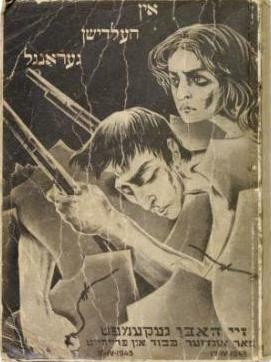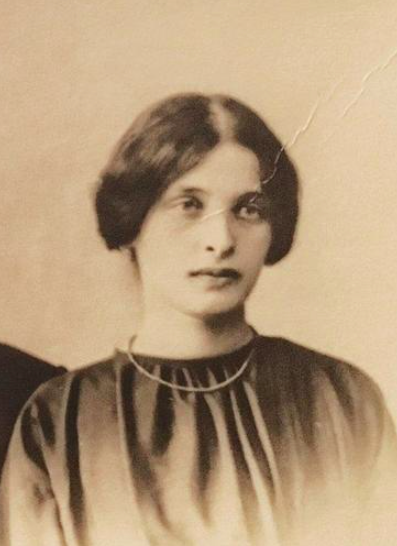Jewish Women Resisters
Oral histories of women partisans and resisters told firsthand and by their descendants
Judy Batalion’s new book, The Light of Days, excavates the history of the ‘Nazi-fighting women of the Jewish resistance’—a history that has largely been ignored within the broader history of Jewish resistance during World War II. Inspired by this work and by the daring and courageous Jewish women who have fought against violence and oppression throughout history, we’re sharing resources from our collections on this theme of women resisters.
The selections below include oral histories of women partisans and resisters told firsthand and by their descendants, as well as podcasts, audio recordings, and memoir excerpts. These represent just some of the ways in which these women's stories are told within our collections; you can use the search function on our website to find even more. We hope these stories of bravery inspire you as they have inspired us.
(Header image: A group of female Jewish partisans. Source: USHMM.)
ORAL HISTORIES
(Above) "Compared With The Ghetto, It Wasn't Bad": Memories Of Being A Partisan In The Woods Around Vilna: Liba Augenfeld—Vilna native, former Jewish partisan and prominent Yiddish cultural activist after immigrating to Montreal—remembers her time as a partisan during World War II.
"She Has to Come to Grips with It": A Jewish Partisan Comes Face-to-Face with A Nazi Collaborator: Elliott (Elye) Palevsky reflects on a particular moment from his travels to Lithuania when his mother, a partisan and Holocaust survivor, spoke with a Lithuanian who admitted to helping the Germans lead Jews onto trains, to their subsequent deaths.
"They Gave Illegal House Concerts": Life of a Jewish Artist in the Underground in the Netherlands During Nazi Occupation: Jalda Rebling—Renewal Cantor and Yiddish performer—tells the story of how her mother, renowned Yiddish performer Lin Jaldati, lived in the underground system of resistance for Jews in the Netherlands before being deported to Auschwitz.
How I Came to Join the United Partisan Organization (FPO) in the Vilna: Fania Brantsovsky—former Jewish partisan during World War Two and librarian of the Vilnius Yiddish Institute—remembers how she became involved with the Fareynikte Partizaner Organizatsye (FPO), the United Partisan Organization in the Vilna Ghetto.
Because Those Who Died Can't Tell These Stories: Fania Brantsovsky, librarian of the Vilnius Yiddish Institute and former Jewish partisan fighter, explains why even in her nineties she continues to speak with groups about her hometown, Vilna, and its rich Jewish cultural history.
AUDIO RECORDING
The Jewish Heroines and Partisans of the Resistance (in English, though beginning is in Yiddish), a 1982 commemoration of the Holocaust by Joshua Shikl Fishman, featuring Yuri Shul. Available in our Frances Brandt Online Yiddish Audio Library.

PODCASTS
Judy Batalion talks with The Shmooze about the amazing story behind her new book, The Light of Days: The Untold Story of Women Resistance Fighters in Hitler's Ghettos, which began with the discovery of a Yiddish memoir.
Yiddish Book Center alumna and fellow Abigail Weaver talks to The Shmooze about Grains of Wheat, her play about the Jewish intellectuals, known as the Paper Brigade, who worked to hide stores of cultural materials from Nazi forces in the Vilna Ghetto.
ARTICLE
“The Librarians," a chapter from Rokhl Auerbach’s 1974 memoir Varshever tsavoes (Warsaw Testaments) about two courageous people, Bashe Berman and Leyb Shur, who helped provide books to children and families and individuals in the Warsaw Ghetto.
RADIOCAST SERIES
This radiocast series and the excerpt below are from the memoir of Klara Klebanova, a middle-class Jewish teenager who became a Maximalist revolutionary fighting for the rights of peasants and factory workers during the first Russian Revolution of 1905. Though Klebanova's story of resistance takes place decades before the other stories highlighted here, hers is nonetheless a powerful story of Jewish women actively engaged in the struggle against oppression.
The Last Maximalist is a twelve-part audio series based on the memoir of Klara Klebanova, translated from the Yiddish and read by acclaimed actress, translator, and director, and Yiddish Book Center alumna, Caraid O'Brien.

MEMOIR EXCERPT
"Petticoats and Bombs," an excerpt from Klebanova’s memoir, translated by Caraid O'Brien.
If you're interested in learning more about Yiddish women writers, check out our resource page on Yiddish women's writing in our collections.
